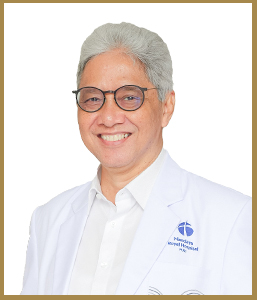Hernia is not only experienced by adults — babies can also develop hernias. This condition often causes concern among parents. The good news is, baby hernia can be effectively treated through surgery.
Mandaya Royal Hospital Puri is supported by a senior and experienced pediatric surgeon specializing in baby hernia surgery, dr. Sastiono, Sp.B Subsp.Ped(K).
Contents
What is a Hernia?
A hernia occurs when an internal organ pushes through a gap or weakness in the muscle or tissue that normally holds it in place. In many cases, hernia develops when abdominal organs protrude through the abdominal wall.
This condition can progress gradually with age as muscles weaken due to aging and daily activity. However, hernias may also be caused by injury, previous surgery, or congenital defects present from birth.
Types of Hernia by Location
Here are the common types of hernia:
1. Inguinal Hernia
The most common type, accounting for around 75% of all hernia cases, and more frequent in men. It occurs when a portion of the intestine pushes into the inguinal canal in the groin.
2. Femoral Hernia
A rare type of hernia that develops in the femoral canal, located just below the inguinal canal. It usually involves fatty tissue pushing out through the gap.
3. Hiatal Hernia
A relatively common type, occurring when the opening in the diaphragm widens, allowing the upper stomach to move up into the chest cavity through the esophagus.
4. Congenital Diaphragmatic Hernia
A serious birth defect where the diaphragm does not fully close during fetal development, causing abdominal organs to shift into the chest cavity and press against the lungs.
5. Incisional Hernia
Develops at the site of a surgical scar on the abdominal wall that weakens over time. This is a common complication after abdominal surgery.
6. Umbilical Hernia
Occurs when part of the intestine protrudes through the abdominal wall near the belly button. Most cases are congenital, present since birth.
7. Ventral Hernia
A general term for hernias that occur in the front abdominal wall, including umbilical and incisional hernias. One form is epigastric hernia, which occurs above the navel.
8. Perineal Hernia
A rare condition in which organs or tissue protrude through a weakness in the pelvic floor muscles into the abdominal cavity.
In babies, the most common types are inguinal hernia (groin) and umbilical hernia (navel).
Hernia Treatment Options
The primary treatment for hernia is surgery. There are two common surgical techniques:
1. Open Surgery
A cut is made in the hernia site, allowing the surgeon to push the organ or tissue back into its proper place inside the abdomen.
2. Laparoscopic (Keyhole) Surgery
A minimally invasive approach using several small incisions to insert specialized surgical instruments. This modern method requires advanced technical skills.
dr. Sastiono, Sp.B Subsp.Ped(K) – Pediatric Surgery Specialist at Mandaya Royal Hospital Puri

Mandaya Royal Hospital Puri is home to one of Indonesia’s leading pediatric surgeons, dr. Sastiono, Sp.B Subsp.Ped(K). He is widely recognized for his expertise in handling rare and complex pediatric surgical cases.
He completed his medical education at the Faculty of Medicine, University of Indonesia (FK UI), including General Surgery (PPDS), Pediatric Surgery (PPDU), and earned his Pediatric Surgery Consultant title at FK UI.
His expertise covers a broad range of pediatric surgery, particularly in hepatobiliary surgery involving the liver, gallbladder, bile ducts, and pancreas. He is also among the few specialists in Indonesia skilled in performing pediatric liver transplantation.
In addition to baby hernia surgery, dr. Sastiono is experienced in managing:
- Biliary atresia in infants (blocked bile ducts)
- Anal atresia (anorectal malformation)
- Pediatric hernia
- Hirschsprung disease
- Appendicitis in children
- Intestinal obstruction in children
- Various pediatric liver disorders
With his extensive experience and reputation, dr. Sastiono is a trusted referral for parents seeking comprehensive, safe, and reliable pediatric surgical care.
Consultation Schedule with dr. Sastiono at Mandaya Royal Hospital Puri
- Tuesday: 10.00 – 13.00 WIB
- Thursday: 10.00 – 13.00 WIB
If you wish to consult with dr. Sastiono, feel free to visit Mandaya Royal Hospital Puri.
For a more convenient visit, you can use Chat via WhatsApp, Book Appointment, or the Care Dokter App, available on Google Play and the App Store, to check queue numbers, book consultations, and access complete hospital information.



